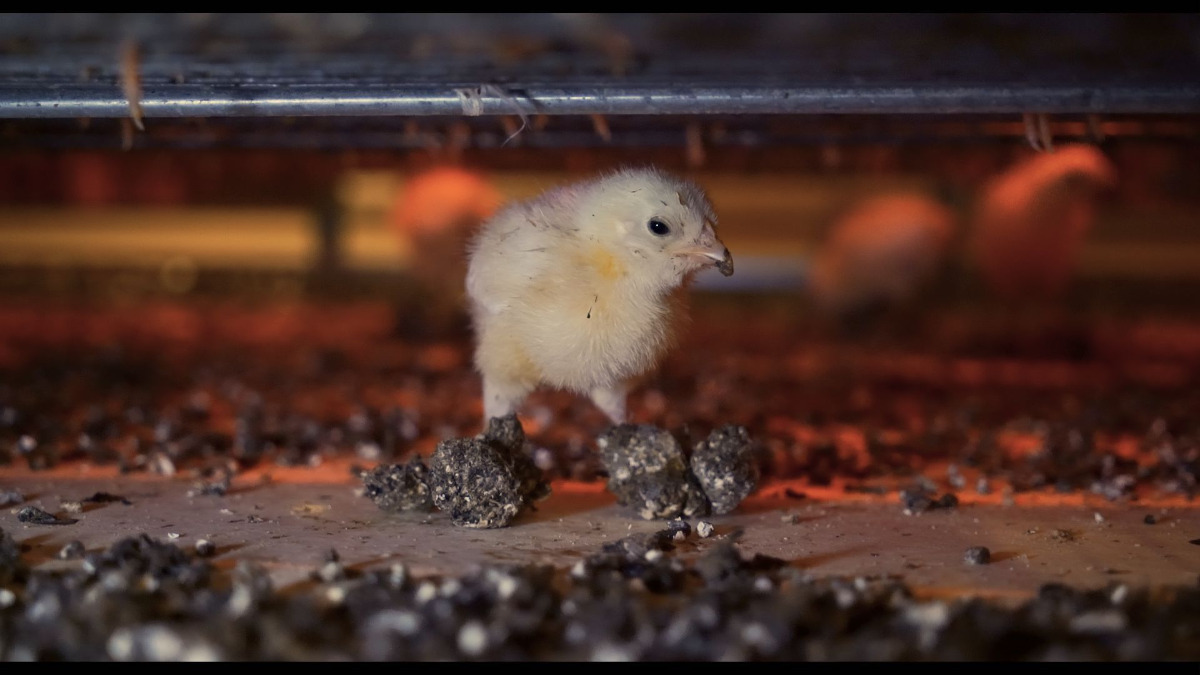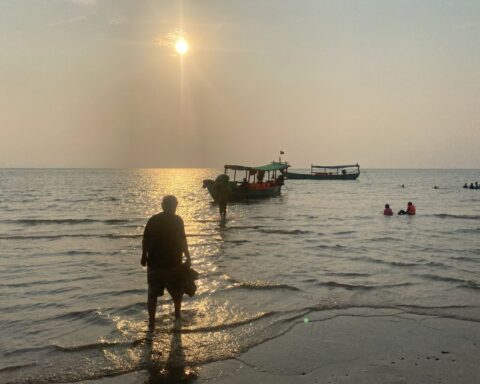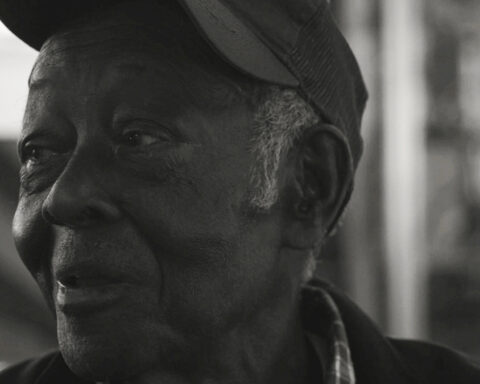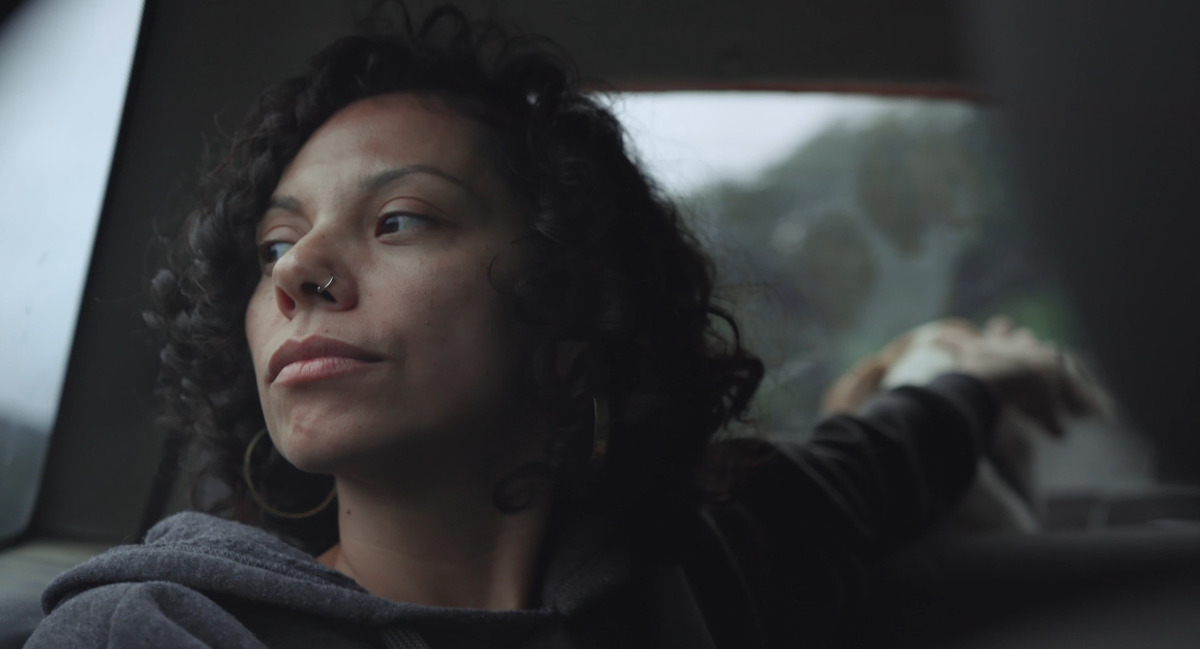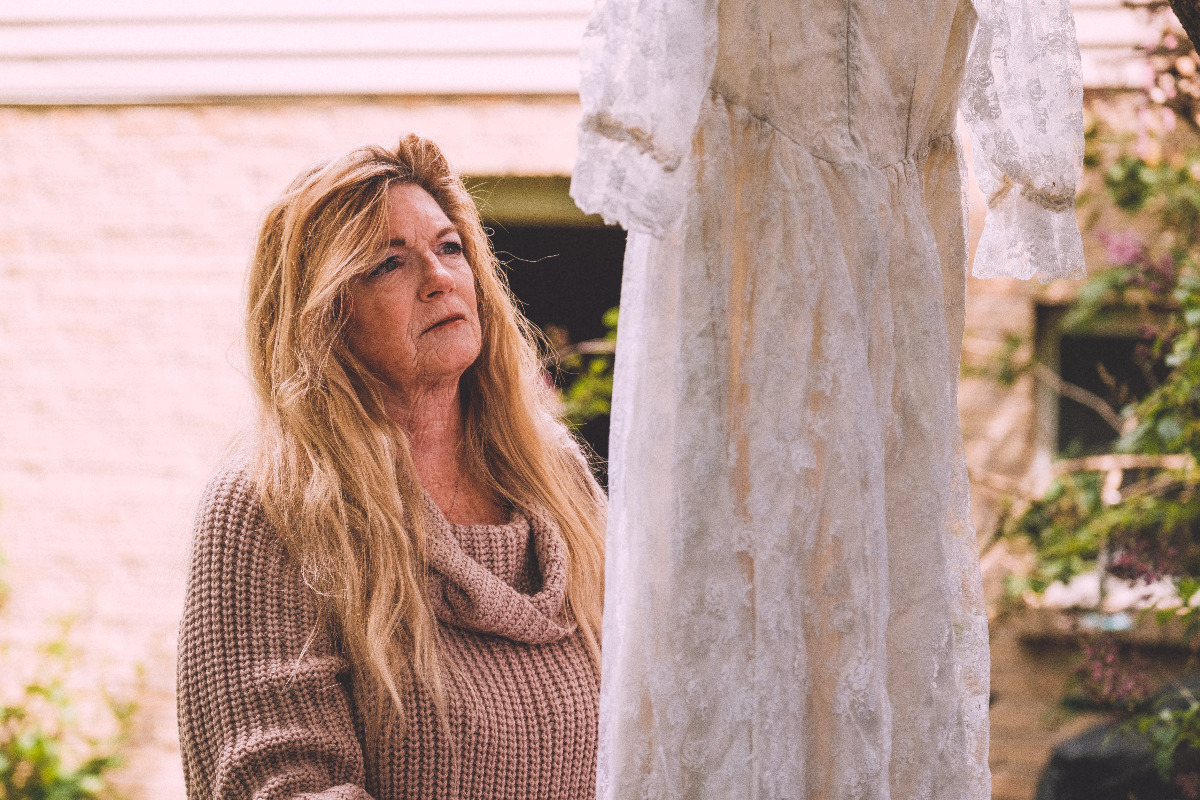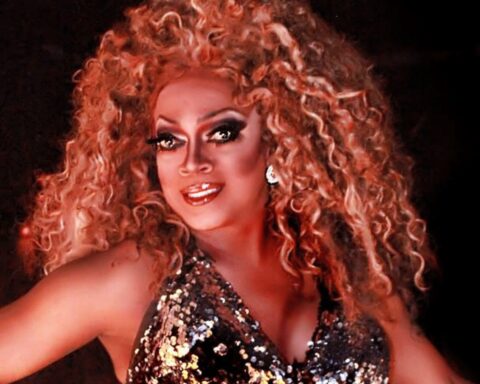“Know yourself and know your hidden motivations,” Saila Kivelä says over Zoom. “Know who you want to make proud and who you want to look up to you.”
Kivelä puts herself front and centre in Just Animals, directed with Vesa Kuosmanen. The film looks back upon Kivelä’s journey as an activist as footage shows her in action alongside her comrade Kristo as they infiltrate farms across Finland and document the conditions in which animals live in the industrial system. Just Animals makes a fair case for developed nations to change their practices when it comes to farming and eating meat, but the cause of the documentary evolves from non-human animals to humans as Kivelä’s disillusionment becomes the focus of the story. She hits a wall after years of fighting, including going to court, for her causes. Burned out, fatigued, and detached, Kivelä turns the camera back on herself and her sister Mia, once an activist and now a politician, to consider what it means to be an effective agent of change.
Just Animals sees Kivelä take her relationships to vulnerable places as she reflects upon an activist’s duty. However, the film brings an activist spark to Hot Docs’ The Changing Face of Europe program where it is the most potently political work in a series. Just Animals might be one individual’s tale in a very small country, but its implications are far-reaching as it looks at the broader hope for the system when passionate individuals like Kivelä continually find themselves hindered by institutions that deny change.
POV spoke with Just Animals directors Saila Kivelä and Vesa Kuosmanen ahead of the film’s premiere at Hot Docs.
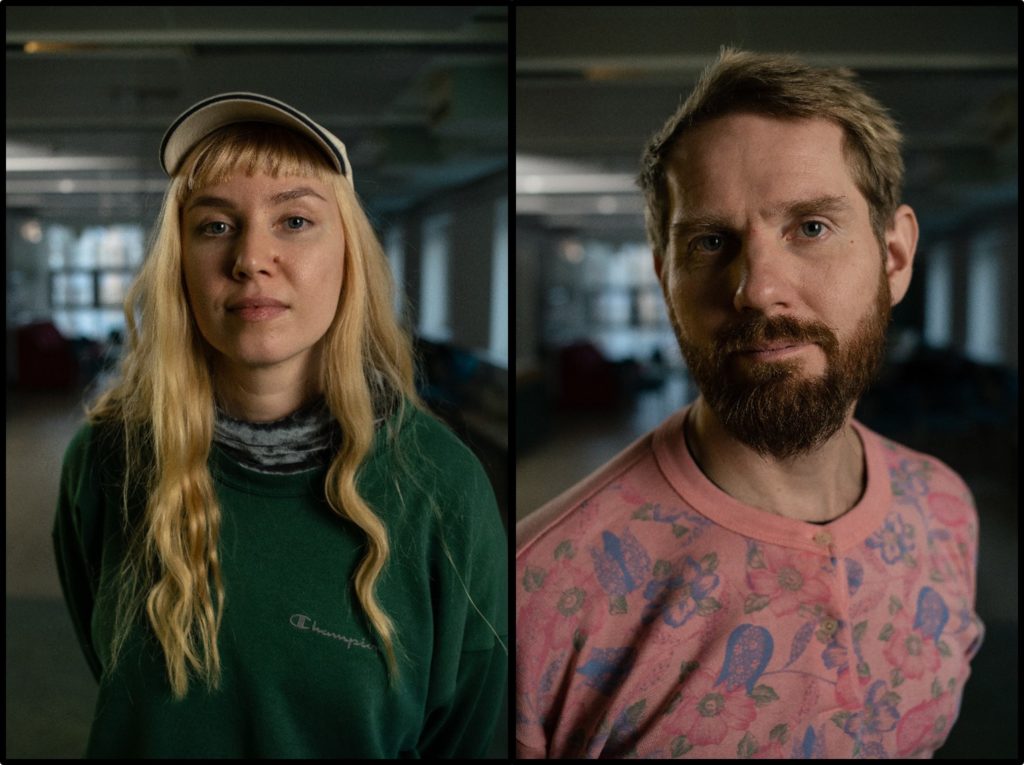
POV: Pat Mullen
SK: Saila Kivelä
VK: Vesa Kuosmanen
This interview has been edited for brevity and clarity.
POV: How did this project come together? Was it collaborative from the beginning?
SK: I started to film in 2011 when we got our charges and, around 2015, I was really worn out with activism. I hit the wall with the last gig that we had at the pig farm and was at a burnout point. I went to therapy in 2016 and met Vesa in 2017. Then, in 2018, I asked Vesa if we should finish the film since I still had the footage. We got a script writing grant and thought there were so many possibilities with the material. We took that half-year and discovered what kind of film we want to make
POV: What attracted you to the project, Vesa?
VK: Obviously Saila is an amazing person in life and in film. I felt that there was something important in the institutional level of the story to tell here, but there was a deeply touching, emotional, personal story as well. I felt all around me that people wanted to change the world, but we all hit the walls. We blame ourselves when it’s not our fault, but the system’s fault. The first day we were shooting, Saila’s sister Mia was in parliament. The film evolved around this one family and that gave it a new direction: we could study the family dynamics, what makes us the people we are, and how should we act in the world.
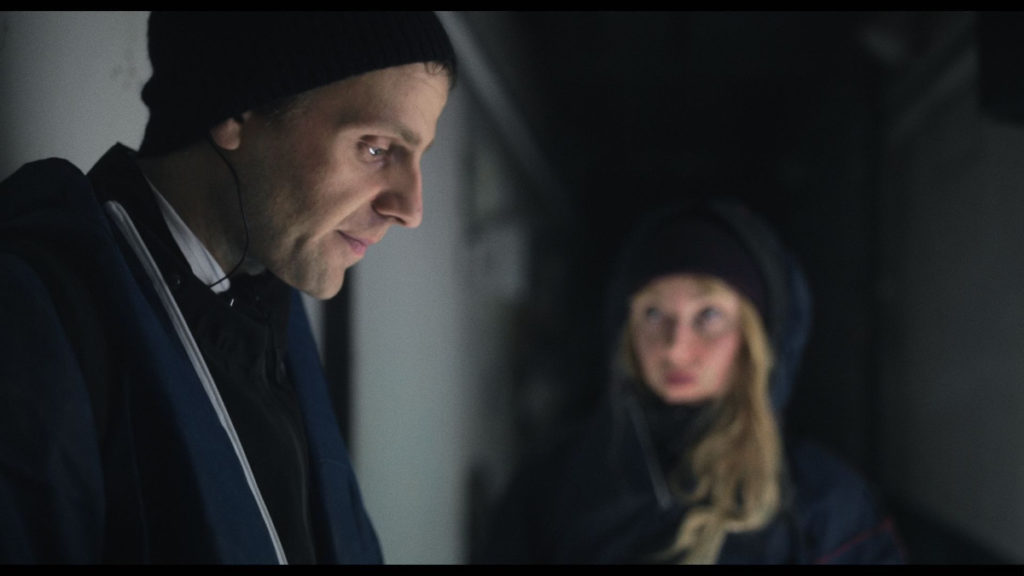
POV: How did so how did your sister feel about being part of the film, Saila?
SK: [Laughs] It was hard. She is a totally different person than me. She handles stress at a societal level and she focuses on new tasks. She found it hard to see the story and was like, “Why are you following me?” I said to her, “You are doing things that not many people do. You started to be an activist when you were nine and you called the office of the premier and said you’re going there in your summer holiday.” Our dad took her every day and she was working in the office eight hours. She’s hardcore, practical, and not really that emotional. She’s really private and that posed a question for me because I’m her sister, but I’m also her director. Some things that happen between us are because we are sisters and not because I’m following her as a film director. She was a really difficult character to film.
At the same time, I love her because she is not your typical documentary character at all. She would be all over the place with her feelings. But there were many layers and I had the feeling she and Kristo dragged me into this kind of world, so I was going to stop them and drag them into my world.
POV: It adds an interesting dynamic that you’re the one interviewing them. Were these done before the collaboration with Vesa? How did you decide who would ask them the questions?
SK: It was after Vesa and me started to work together. They were done quite late in the 10-year spectrum. It’s important that you can see me, and that the questions are not about what happened, but more asking, “How are we here?” I had questions because I’d been following them for many years and it took me to really hard places. I needed to figure out what activism means to me as a whole and because it’s much more than animals. It’s greatly about my relationships.
VK: In the interviews, it’s not what they say, but how they behave—all the micro expressions. As is often with interviews, the less that people talk, the better they are.
POV: What has making this film taught you about being able to navigate the amount of energy and time you can put into something without maxing out your abilities?
SK: It’s really important. I want to talk about activism standards: it can be super hard work. Activism means that you act. If you don’t act, what are you? Only action matters. We never, ever talked about how we felt, even though we saw horrible stuff every night. There is huge contradiction even for me today that you can be a special individual–a hero, an activist–but then it doesn’t matter how strong you are because there is always the system to work against.
VK: There’s been a big shift in activism now that groups are more democratic and you don’t need to hide your identity. Everybody can act in their own ways. That’s what the film is about: we don’t need to choose one path that somebody points us on, but we need to find our own way as we make impact in the world and know our limits.
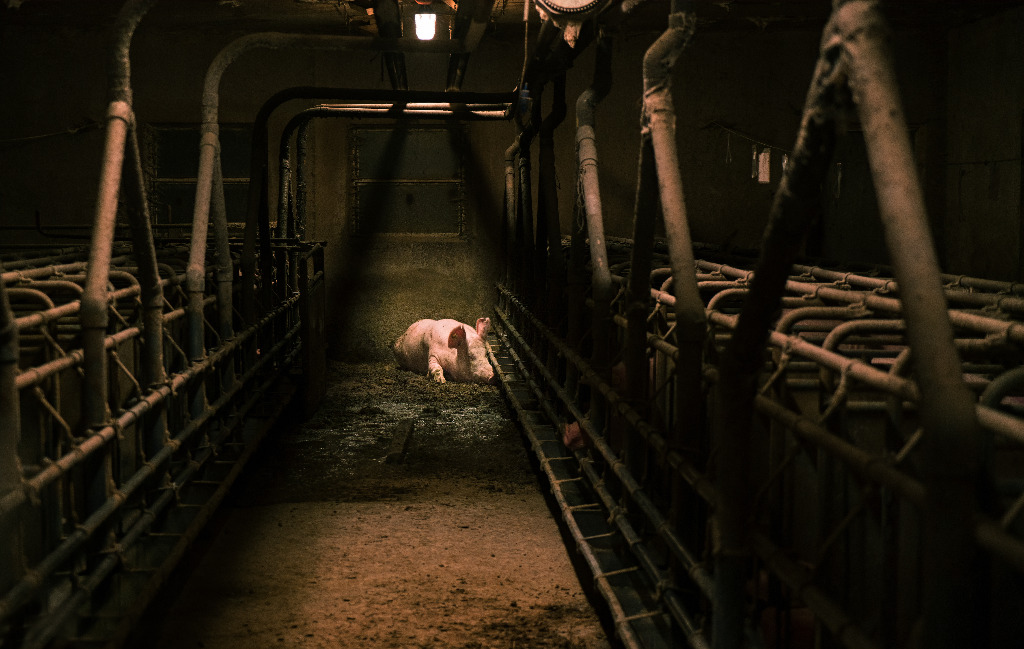
POV: What was the experience like going back to the pig farm and speaking to the farmer whose pens are in the videos?
SK: When we went to the farms, we filmed and then we wrote notes that described what you see in the video. There was some misinterpretation. When we met the farmer, he showed me that he had hay for an extra two years for the pigs if there was a bad year, and he got awards, so he felt there was misleading info. It really opened my eyes that even though you want to only do good, you necessarily cause some people to suffer as you change things. It’s quite hard, but seeing him was really important for me. He’s a nice guy and they made me a vegan dinner. I believe he’s not a bad person, but when you see the farm and the structure, it is what it is because it’s a pig farm.
POV: What difference do you see between documentary and activism?
SK: It’s hard to say who’s an activist because we all act in society and then some acts are labelled as activism. For me personally, it’s different. Activism is when you work with the group and you have tasks, strategies, and goals—it’s a bit in the traditional sense of activism. But, for me, the film is a film. It was important for me to get distance from activism, but of course, I can never say that animals don’t matter to me. I’m sensitive about it, but also getting the distance let me see the emotions that I have for this cause.
VK: The meaning of art for me is to bring people closer to each other and help us to understand each other. That’s the point of making films, to reach towards each other and make us see that we are not different, but the same and to look at those core human values and human qualities we share. I think helps us to see the world through other people’s eyes and make us feel like they do. Activism is about impacting and telling the truth or facts or whatever. For me, they are two completely different things.
POV: How has COVID affected your film or the way people approach activism?
SK: We intended to film the political process and the house of parliament with Mia, but that was a bit difficult. We also thought we could film animals with our crew in the proper farms in the daylight. COVID was an easy excuse for the farmers to say they wouldn’t allow it. It’s hard to get permission, even if you are asking, but with this kind of production, it’s a closed door. [Laughs.]
POV: What advice would you have for filmmakers who might consider doing a collaboration like this one where your subject is a co-director?
VK: Keeping the process as open as possible, and affording it time, is important. Having two people directing when one of them is a main character is a good system, but it’s slower than traditional filmmaking because you both have to see where you are. You also need a good editor and mapping the process is important if one of you hasn’t done a film before so they learn the steps and the process of it. We were lucky to have almost a year of editing time and that helped us a lot.
POV: And Saila, how was making the film in terms of letting you process things compared to therapy?
SK: I went to the therapy before I restarted the film, but I feel that my relationship with my sister was going through all these emotions, and also with Kristo. For me personally, being able to stop these people and get them to answer me was so important. Even though it was difficult, it has been really meaningful for all of us.
Just Animals had its North American premiere at Hot Docs 2022.




